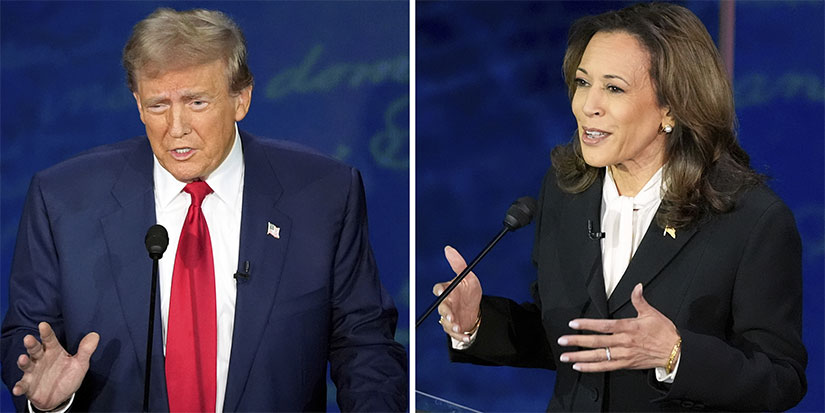
Do Politics Affect the Markets?
How much do politics affect the markets? The way people talk, you would think that politics would affect the markets a lot.
If Kamala Harris is elected, the markets are going to crash. If Donald Trump is elected, the markets are going to rip. Well, it is a bit more nuanced than that. But before we go any further, the answer to the question of whether politics affect markets is not none. Politics can have a huge effect on markets. Just ask Argentina.
Some things that can affect markets:
-
Tax
-
Trade
-
Regulation
-
Monetary policy
Hang on a second! Monetary policy is not supposed to be political. But in this election, it absolutely is political because Trump has said that he wants a voice in setting interest rates… lower. Monetary policy would be unquestionably easier in a second Trump term, which is going to make stocks go up. It will also make the yield curve steepen like a mother.
Taxes Are a Real Concern
Kamala Harris says she will raise taxes. She will allow the Trump tax cuts to expire, which will result in higher rates in every tax bracket, but more importantly, she wants to raise taxes on capital gains and impose a tax on unrealized capital gains. This is very negative for the market, both on a short- and long-term basis. In the short term, if you thought that capital gains rates were going higher, you would sell your winners before the end of the year to avoid the tax hit. If she wins, you can count on a substantial market decline before year-end.
The proposed tax on unrealized gains has more of a long-term effect—it will stifle innovation and creativity. I wrote a Substack on this recently called “What Makes America Different,” if you want to track it down, where I go into detail on taxing unrealized gains. The income taxes are less of a concern—markets have gone up and down in high- and low-tax regimes, and no matter how high you raise income taxes, the tax taken as a percentage of GDP tends to be pretty constant. But capital gains taxes are a real concern.
George W. Bush lowered taxes—and both capital gains and dividends—and the market ripped, especially stocks that paid high dividends. In the 2004 election, which was Bush vs. Kerry, the stock market rallied hard after the election because the tax cuts would remain intact. So yes, politics affects elections, especially when it comes to tax matters.
I should mention the corporate tax. Kamala Harris says she is going to raise it. This has a direct impact on valuations because it reduces future earnings. If corporate taxes go from 21% to 28%, valuations will be reduced accordingly.
So, the people who say that the stock market will crash if Harris gets elected are not entirely wrong. Of course, it might not crash because stocks are going to do what stocks are going to do, but this is all academic; and in an idealized assessment of the markets, yes, if Kamala Harris gets elected, the stock market should go down. And if Trump gets elected, the markets should go up… maybe.
Regulation
That brings me to regulation, which imposes a cost on all corporations, big and small, and you can make the argument that big corporations are better able to deal with regulation than small firms.
Trump is making noises about appointing Elon Musk to some commission to increase the efficiency of government. Knowing Elon Musk, he will probably fire millions of government employees and slash regulations—that is, if this comes to pass, which is a big “if.” This, too, should theoretically make the stock market go up. Kamala Harris would seem to represent an expansion of the coercive regulatory state, which would be negative. So again—score one for Trump.
On the other hand, Trump is very much against free trade, and Harris doesn’t seem to be a big proponent either, but she doesn’t have any concrete plans to enact tariffs across the board. It’s been a long time since we’ve done this, and by this, I mean erecting high trade barriers.
This is inflationary in the short term, of course, and that yield curve is going to, again, steepen like a mother. In the long term, trade barriers are highly detrimental—through protectionism, they allow domestic firms to become flabby and undisciplined and less competitive.
Does it have an effect on the stock market? Hard to say. It might be positive in the short term (we export more) but negative in the long term. As Bastiat said, “When goods don’t cross borders, soldiers will.”
So, ignore politics at your peril. For example, the DOJ just went after Nvidia. If you have an index fund in your 401(k), it is now about 3% lower because of actions taken by the Biden administration. But I want to reiterate that politics isn’t everything, and the market will do unexpected things.
For example, I wouldn’t expect a repeat of the 2016 election when the market was 20% higher in a few months following a Trump win. Also, don’t “bet” on the election. Elections are unpredictable, and it comes down to how people feel on November 5, not today.

Jared Dillian, MFA
P.S. Help me out with two things!
My short story collection, NIGHT MOVES, is coming out on September 23. You can preorder the e-book today. If you want a paperback copy, you will have to wait until the 23rd. But if you’re a Kindle person, please preorder today.
Also, please check out my new music, “Vista,” here. You won’t regret it.
|